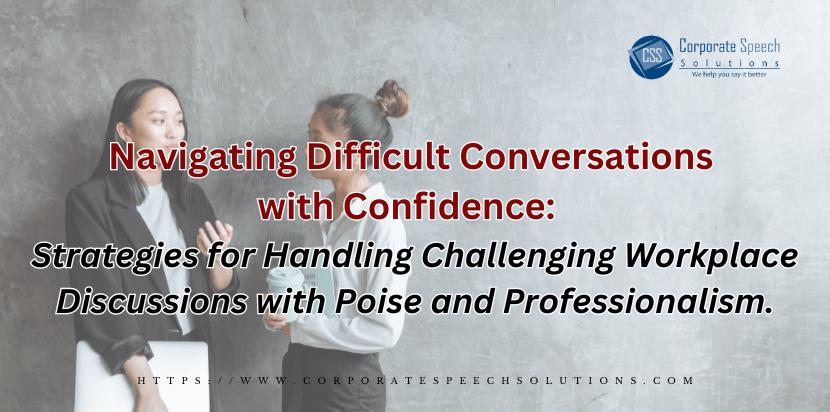Many professionals struggle with workplace discussions not because they lack knowledge, but because they lack effective communication strategies.
Difficult conversations are an inevitable part of professional life. Whether you’re addressing performance concerns, giving critical feedback, or negotiating workplace conflicts, knowing how to handle these discussions with confidence and professionalism is essential. Mastering this skill helps maintain healthy working relationships, fosters trust, and ensures smooth collaboration within a team.
At Corporate Speech Solutions, we specialize in helping leaders and teams refine their communication skills, ensuring they can navigate tough conversations with clarity and confidence. In this blog, we’ll explore strategies to navigate challenging workplace discussions with poise and professionalism while keeping your confidence intact.
Why Difficult Conversations Matter in the Workplace
Avoiding difficult conversations can lead to unresolved conflicts, miscommunication, and decreased productivity. On the other hand, approaching these discussions with confidence ensures:
- Stronger Professional Relationships – Open, honest communication builds mutual respect.
- Increased Workplace Efficiency – Addressing problems directly helps resolve issues faster.
- A Positive Work Environment – Transparent communication promotes trust and collaboration.
- Personal and Professional Growth – Developing communication skills enhances leadership potential.
Now, let’s look at key strategies to handle challenging conversations effectively.
1. Prepare and Plan Ahead
Before initiating a difficult conversation, preparation is crucial. Here’s how you can get ready:
- Define Your Goal – Identify the main purpose of the conversation and what outcome you hope to achieve.
- Gather Facts – Base your discussion on objective information rather than assumptions or emotions.
- Anticipate Responses – Consider how the other person might react and prepare for possible scenarios.
- Choose the Right Time and Place – A private, neutral setting can help keep the discussion productive.
Being prepared boosts your confidence and ensures the conversation remains focused and professional.
2. Approach with Empathy and Active Listening
Empathy is key when handling difficult conversations. Instead of being defensive or aggressive, aim to:
- Listen Actively – Let the other person speak without interruptions.
- Acknowledge Their Perspective – Validate their feelings and show understanding.
- Use Open-Ended Questions – Encourage dialogue rather than giving one-sided statements.
Empathetic communication fosters a constructive and respectful discussion.
3. Use Clear and Respectful Language
The words you choose can impact the tone and outcome of the conversation. To ensure clarity:
- Be Direct but Courteous – Avoid vague statements; clearly express your concerns without being harsh.
- Use “I” Statements – For example, instead of saying “You never meet deadlines,” say “I’ve noticed that deadlines have been missed, and I’d like to understand why.”
- Keep Emotions in Check – Stay calm and composed, even if the discussion becomes tense.
A professional tone helps keep the conversation solution-focused rather than confrontational.
4. Focus on Solutions, Not Blame
Instead of assigning blame, focus on finding a resolution:
- Identify Common Goals – Emphasize shared objectives to create a sense of teamwork.
- Encourage Collaboration – Involve the other person in brainstorming solutions.
- Set Clear Expectations – Define actionable steps to prevent future issues.
This approach promotes a constructive outcome rather than escalating conflicts.
5. Manage Conflict with Professionalism
If emotions run high, it’s important to stay professional:
- Stay Calm and Composed – Take deep breaths and control your body language.
- Reiterate Key Points – Keep the conversation focused on facts rather than emotions.
- Take a Break if Needed – If tensions escalate, suggest pausing and resuming later.
Handling conflicts professionally ensures discussions remain productive and respectful.
6. Follow Up and Maintain Accountability
After the conversation, reinforce positive outcomes by:
- Summarizing Key Takeaways – Recap the discussion to ensure mutual understanding.
- Following Up on Action Items – Monitor progress to keep everyone accountable.
- Checking In Periodically – Assess if the issue has been resolved or if further discussions are needed.
Effective follow-ups demonstrate leadership and commitment to maintaining a positive workplace culture.
How Communication Training Transforms Workplace Interactions
Through targeted coaching, we help professionals:
- Develop executive presence to command respect in conversations
- Learn strategic phrasing to diffuse tension and encourage solutions
- Enhance vocal tone and body language to project authority and empathy
- Build active listening skills to foster stronger workplace relationships
Why Leaders Should Invest in Communication Training for Their Team
Avoiding or mishandling difficult conversations can lead to low morale, high turnover, and workplace inefficiencies. Investing in expert training equips your team with the skills to address concerns proactively, leading to a more engaged and productive workforce.
Bringing it All Together
Navigating difficult workplace conversations with confidence is a valuable skill that strengthens professional relationships and enhances productivity. By preparing ahead, practicing empathy, using clear communication, and focusing on solutions, you can handle challenging discussions with poise and professionalism.
Remember, every difficult conversation is an opportunity for growth. When managed effectively, these discussions lead to stronger relationships, better teamwork, and a healthier work environment.
Embrace difficult conversations with confidence, and watch your professional communication skills reach new heights!
How Corporate Speech Solutions Can Help
Our training programs are designed to meet the specific needs of executives, managers, and teams. We provide customized coaching that helps professionals speak with authority, manage conflicts effectively, and drive business outcomes through clear communication.
Take Action
Would your team benefit from expert guidance on handling high-stakes conversations?
Click here to schedule a call.
Copyright 2024, Jayne Latz works with organizations and individuals that want to develop clear, concise and confident communication to accelerate career success.
Email: jayne@corporatespeechsolutions.com | Phone: 917.841.2965


Comments are closed